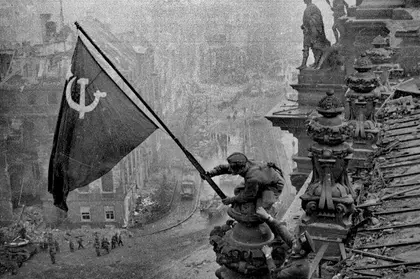Like other mafia states, modern Russia rests on an incoherent ideology. It has built an image of itself around a dubious foundational myth, an image that cynically exploits and sacralizes the word “victory,” for which it has created a host of prescribed rituals.
Russia employs a chain of arguments that paint it as a society entitled to a certain role in history as a matter of “justice.” Many of these falsifications and half-truths are disseminated throughout the West: Russia singlehandedly defeated Nazism; Russia was duplicitously tricked; and Russia is a “great” country, so it can do “anything.”
- View the most up-to-date Ukraine news articles published today.
- Obtain the most current Ukraine news articles released today.
JOIN US ON TELEGRAM
Follow our coverage of the war on the @Kyivpost_official.
Anyone in Russia who rejects these fables or calls them what they are – lies – is immediately met with screams of “our grandfathers saved the world!”
The myth of World War II was planted by Stalin, nurtured by Brezhnev, and is now blossoming under Putin’s rule. The current Russian president has been scrupulously following his predecessors’ examples of using these lies to advance their autocracy, domestic repression, and international aggression.
What are the major points of the Kremlin’s myth? Here are 10 key lies:
1. “The Great Patriotic War” began on June 22, 1941. Moscow has long taught that World War II began when Nazi Germany invaded the Soviet Union. They conveniently forget to mention that it actually began nearly two years earlier, on Sept. 1, 1939, when Germany invaded Poland, and that the Soviet Union was then allied with Germany and concluded a secret pact to divide Poland between them – a division by which Moscow also swallowed the independent Baltic states.

Putin and Xi Praise Ties, Hours After Trump Sworn In
2. The USSR hated Nazism. Anti-Nazi and anti-fascist pre-war propaganda ceased in 1939 with the signing of the Molotov-Ribbentrop Pact mentioned above, whereby Moscow and Berlin would divide Eastern Europe. Having fallen into league with the Nazis, the Soviet propaganda machine turned its attention to attacking the British, who had “launched the war against Germany.” Not until after the Nazis invaded the USSR, in June 1941, did anti-Nazi slogans return to Soviet society.
3. The USSR was brilliant in “buying time” with the Molotov-Ribbentrop Pact. The fact is that Stalin was delighted to use the Pact to wage aggression against Poland, Finland, Romania, and the Baltic States. The USSR was unprepared in 1941 precisely because Stalin did not believe Germany would betray him and invade.
4. The USSR was tranquil before the German invasion. No, it was not. Stalin had already swept into Poland and Finland before the German invasion in 1941.
5. The USSR was selfless in its sacrifice during the War. In reality, the USSR was self-serving. Stalin was keen to annex and occupy territories formerly belonging to the Russian Empire and beyond, both in 1939-40 and in 1945-46. How many? From north to south: Petsamo, the Karelian Isthmus, Estonia, Latvia, Lithuania, the north of East Prussia, eastern Poland, Transcarpathia, northern Bukovina, and Bessarabia.
6. The Soviets alone defeated Hitler. Even Stalin did not believe this lie, as he had to admit that without the tanks, planes, trucks, steam locomotives, gunpowder, explosives, steel, aluminum, fuel, clothes, shoes, stew and powdered eggs, received thanks to America’s Lend-Lease, any victory would have been out of the question – not to mention the key role of Allied military action in opening a new front in the West.
7. The Allies did not want a second front in France. To the contrary: Churchill and Roosevelt understood who Stalin was and what he might do in Europe, which he was conquering, so they tried to get to Berlin faster than the Russians.
8. The Soviet soldiers were unanimously heroic. In reality the Soviets had “penalty companies” meant to prevent soldiers from retreating. “Not a step back” was the order of the day, and if soldiers disobeyed, then the consequence would be summary execution. Then there were the Russians of General Andrey Vlasov’s army, which collaborated with the Germans. They would not have existed if everything were as rosy as the Russian myth claims.
9. The USSR strictly obeyed all treaties. The USSR flippantly did as it pleased. In 1944 it started a war with Bulgaria even though there was no conflict, just as in 1945 it violated its non-aggression treaty with Japan.
10. Europe was liberated by the Red Army. Eastern Europe was largely occupied and robbed, its peoples enslaved by Moscow for 45 years, often with methods as brutal as the Nazis’.
Without question, World War II was the bloodiest tragedy in human history and the people of the Soviet Union suffered greatly. However, it is travesty that the horrific slaughter, which Stalin had in many respects initiated, has over the years been whipped into a national religion.
The views expressed in this opinion article are the author’s and not necessarily those of Kyiv Post.
You can also highlight the text and press Ctrl + Enter










